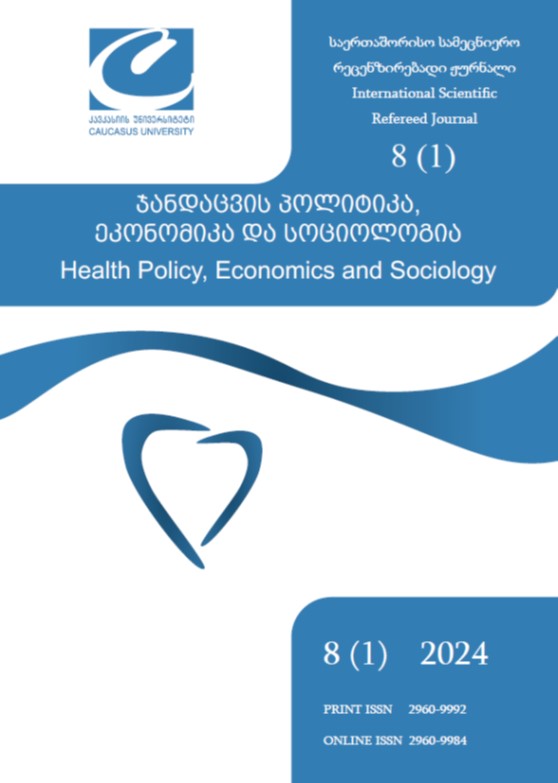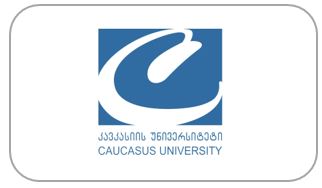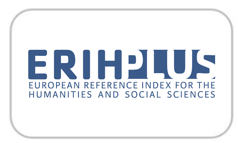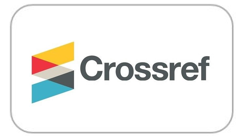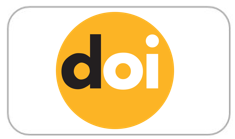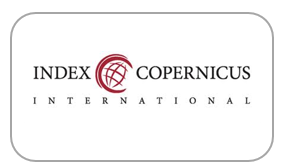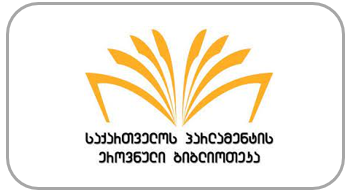გარე რეფერენტული ფასწარმოქმნის პოლიტიკის თავისებურებები ევროპის ქვეყნებში
DOI:
https://doi.org/10.52340/healthecosoc.2024.08.01.11საკვანძო სიტყვები:
ჯანდაცვის ხარჯების ზრდა, მედიკამენტებზე ხელმისაწვდომობა, გარე რეფერენტული ფასწარმოქმაანოტაცია
მედიკამენტების მაღალი ფასები ხელს უწყობს ჯანდაცვის ხარჯების ზრდას, რაც ამცირებს მათზე მოსახლეობის ფინანსურ ხელმისაწვდომობას. საქართველოში მედიკამენტების სიძვირის ერთ-ერთი მიზეზია ფარმაცევტული სფეროს რეგულირების მნიშვნელოვანი ხარვეზები, რომლის შედეგია მედიკამენტების ჭარბი მოხმარება და დაურეგულირებული ფასები. მედიკამენტების ფასების რეგულირების და შესაბამისად მასზე ფინანსური ხელმისაწვდომობის გასაზრდელად 2022 წლიდან საქართველოში ამოქმედდა გარე რეფერეტული ფასწარმოქმნის პოლიტიკა. საქართველოში გარე რეფერენტული ფასწარმოქმნის მეთოდის დანერგვის შედეგად მედიკამენტებზე ხელმისაწვდომობა გაიზარდა და ჯიბიდან მაღალი გადახდები შედარებით შემცირდა. ფარმაცევტული ფასებისა და შესყიდვის ეფექტიანი პოლიტიკის შემუშავებისას, საქართველოს მთავრობამ უნდა გაითვალისწინონ მსოფლიოში დაგროვილი გამოცდილება. მნიშვნელოვანია გარე რეფერენტული ფასწარმოქმნის მექანიზმთან ერთად, ფასების სხვადასხვა ტექნიკების ეტაპობრივი დანერგვა.
წყაროები
აზიკური თ., & ვერულავა თ. (2022). მედიკამენტებზე ფასების რეგულირების პოლიტიკა: რეკომენდაციები საქართველოსათვის. ჯანდაცვის პოლიტიკა, ეკონომიკა და სოციოლოგია, 6.
ბაკარაძე ქ. (2023). რეფერენტული ფასწარმოქმნის პოლიტიკა ჩრდილოეთ ევროპის ქვეყნებში. ჯანდაცვის პოლიტიკა, ეკონომიკა და სოციოლოგია, 7(1).
მასიუკოვიჩი ნ. (2023). ფარმაცევტული ბაზრის რეგულირება დასავლეთ ბალკანეთის ქვეყნებში. ჯანდაცვის პოლიტიკა, ეკონომიკა და სოციოლოგია, 7(1).
ნემსაძე დ. (2023). მედიკამენტებზე რეფერენტული ფასწარმოქმნა მოლდოვეთში: გამოცდილება, გამოწვევები. ჯანდაცვის პოლიტიკა, ეკონომიკა და სოციოლოგია, 6.
საქართველოს ოკუპირებული ტერიტორიებიდან დევნილთა შრომის ჯანმრთელობისა და სოციალური დაცვის სამინისტრო. (2018). საქართველოს ჯანდაცვის ეროვნული ანგარიში. თბილისი.
საქართველოს მთავრობის დადგენილება №593, (2022) წლის 26 დეკემბერი, ფარმაცევტული პროდუქტის ფასის რეგულირების მეთოდოლოგიის, წესისა და პირობების დამტკიცების შესახებ კანონი. თბილისი.
Acosta, A., Ciapponi, A., Aaserud, M., Vietto, V., Austvoll-Dahlgren, A., Kösters, J. P., Oxman, A.D. (2014). Pharmaceutical policies: effects of reference pricing, other pricing, and purchasing policies. The Cochrane Database of Systematic Reviews, 2014(10). https://doi.org/10.1002/14651858.CD005979.PUB2.
Curatio International Foundation, (2022). External Reference Pricing Policy: A Possible Pharmaceutical Price Regulation Policy in Georgia.
De Joncheere K, Haaijer-Ruskamp FM, Rietveld AH, Dukes MNG. (2002). Scope of the problem. In: Dukes MNG, HaaijerRuskamp FM, De Joncheere CP, Rietveld AH (eds). Drug and Money—Prices, Affordability and Cost Containment. 7th edn. Amsterdam, the Netherlands: IOS Pres.
Carone G, Schwierz C, Xavier A, (2012). Cost-containment policies in public pharmaceutical spending in the EU. http://mpra.ub.uni- muenchen.de/42008/1/MPRA_paper_42008.pdf
Espin J, Rovira J, de Labry AO. (2011). Review series on pharmaceutical pricing policies and interventions: working paper 1: external reference pricing. WHO/HAI Project on Medicine Prices and Availability.
Jacobzone S. (2000). Pharmaceutical Policies in OECD Countries: Reconciling Social and Industrial Goals. Organization for Economic Cooperation and Development. http://titania.sourceoecd.org/vl¼3114515/cl¼24/ nw¼1/rpsv/workingpapers/18151981/wp_5lgsjhvj7s0x.htm, ხელმისაწვდომია 7/12/2024.
Goginashvili, K., Nadareishvili, M., & Habicht, T. (2021). Can people afford to pay for health care? New evidence on financial protection in Georgia.
Lee, I. H., Bloor, K., Hewitt, C., & Maynard, A. (2015). International experience in controlling pharmaceutical expenditure: influencing patients and providers and regulating industry - a systematic review. Journal of Health Services Research & Policy, 20(1), 52–59. https://doi.org/10.1177/1355819614545675
Leopold, C., Mantel-Teeuwisse, A. K., Seyfang, L., Vogler, S., de Joncheere, K., Laing, R. O., & Leufkens, H. (2012). Impact of External Price Referencing on Medicine Prices – A Price Comparison Among 14 European Countries. Southern Med Review, 5(2), 34.
Lu Y, Hernandez P, Abegunde D, Edejer T. (2011). The World Medicines Situation 2011—Medicine Expenditures. Geneva: World Health Organization.
Mossialos E, Brogan D, Walley T. (2006). Pharmaceutical pricing in Europe: weighing up the options. International Social Security Review 59: 3–25.
National Democratic Institute, (2019). Public Opinion Polls in Georgia.
Rietveld AH, Haaijer-Ruskamp FM. (2002). Policy options for cost containment of pharmaceuticals. In: Dukes MNG, HaaijerRuskamp FM, De Joncheere CP, Rietveld AH (eds). Drugs and Money—Prices, Affordability and Cost Containment. 7th edn. Amsterdam, the Netherlands: IOS Press.
Rémuzat, C., Urbinati, D., Mzoughi, O., Hammi, E. El, Belgaied, W., & Toumi, M. (2015). Overview of external reference pricing systems in Europe. Journal of Market Access & Health Policy, 3(1), 27675. https://doi.org/10.3402/JMAHP.V3.27675.
OECD. (2008). Pharmaceutical Pricing Policies in a Global Market. http://www.centad.org/seminar/2.%20Price%20regulation/OECD %20Pharma%20pricing%20policies.pdf. ხელმისაწვდომია 7/12/2024.
Vogler S, Paris V, Ferrario A, Wirtz VJ, de Joncheere K, Schneider P, et al. (2017). How can pricing and reimbursement policies improve afordable access to medicines? Lessons learned from European countries. Appl Health Econ Health Policy. 15(3):307–21.
Vogler, S., Lepuschütz, L., Schneider, P., & Stühlinger, V. (2015). Study on enhanced cross-country coordination in the area of pharmaceutical product pricing . https://doi.org/10.2875/631265.
Vogler S, Habl C, Leopold C, Rosian-Schikuta I, de Joncheere K, Thomsen TL. (2008). PPRI Report. Vienna, Austria: Commissioned by European Commission, Directorate-General Health and Consumer Protection and Austrian Federal Ministry of Health, Family and Youth.
World Health Organization, (2018). Medicines Reimbursement Policies in Europe. https://iris.who.int/handle/10665/342220.
World health statistics, (2023). monitoring health for the SDGs, sustainable development goals.
Who (2019). World Health Organization, Department of Essential Medicines and Health Products. WHO guideline on country pharmaceutical pricing policies.
The WHO Collaborating Centre for Pricing and Reimbursement Policies, Glossary. Available from: http://whocc.goeg.at/Glossary/PreferredTerms/External price referencing (cited 14 August 2013).
Who (2020). WHO Guideline on Country Pharmaceutical Pricing Policies. Available at: https://www.who.int/publications/i/item/9789240011878 (Accessed March, 2021).
WHO. (2004). The World Medicines Situation. ttp://www. who.int/medicines/areas/policy/world_medicines_situation/en/, ხელმისაწვდომია 7/12/2024.
